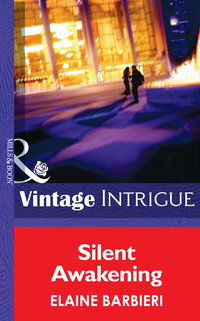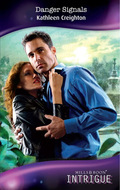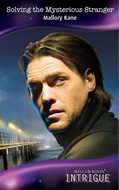Buch lesen: "Silent Awakening"
Two detectives stood back a few paces from the scene
The shorter, light-haired man acknowledged Natalie with a polite nod, while the other—
The other detective was tall and broad shouldered, dressed in a sports jacket that had seen better days and denim pants that had been washed enough times to mold his long, muscular legs just a little too keenly. His thick, wavy hair needed to be cut, his light eyes were deeply shadowed under brows as dark as his hair, he needed a shave and he was scowling at her as if she were the enemy.
As if reading her mind, the detective raked her up and down with a look so intimately insulting that she could feel the heat rise to her cheeks.
She realized that he was prepared to dislike her.
Fine. Because she didn’t like the looks of him, either.
Silent Awakening
Elaine Barbieri
MILLS & BOON
Before you start reading, why not sign up?
Thank you for downloading this Mills & Boon book. If you want to hear about exclusive discounts, special offers and competitions, sign up to our email newsletter today!
Or simply visit
Mills & Boon emails are completely free to receive and you can unsubscribe at any time via the link in any email we send you.
This story is derived from an actual criminal case history.
The cancer-inducing drug referred to on the following pages,
used on rats for research purposes, is untraceable
in the human body. It remains unidentified to
the general public for obvious reasons.
The way this unnamed drug was utilized for revenge
by a spurned lover is factual.
The characters, plot
and the name of the drug are fictional.
ABOUT THE AUTHOR
Elaine Barbieri was born in a historic New Jersey city. She has written forty-two novels and has been published by Berkley/Jove, Leisure, Harlequin, Harper, Avon and Zebra Books. Her titles have hit USA TODAY and major bestseller lists across the country, and are published worldwide. Ms. Barbieri has received many awards for her work, including Storyteller of the Year, Awards of Excellence and Best Saga Awards from Romantic Times magazine. Her novels have been Doubleday and Rhapsody Book Club selections, and her book More Precious Than Gold was a launch novel for Romance Alive Audio. Ms. Barbieri lives in West Milford, New Jersey, with her husband and family.
CAST OF CHARACTERS
Natalie Patterson—The CDC lab tech couldn’t let justice go undone. But exposing a brilliant murderer puts her on the killer’s most-wanted list.
Detective Brady Tomasini—The tough homicide cop and the classy lab tech are like oil and water. So why is serving and protecting Natalie becoming the most important duty of his career?
Dr. Wilson Gregory—He’s very eager to have Natalie stay at his family apartment and continue to advise the police staff.
Dr. George Minter—Natalie’s boss is very proud of her. Has his pride become her death warrant?
Dr. Hadden Moore—The genius psycho’s hatred of Natalie is matched by his admiration of her smarts. Which will win out?
Charles Randolph—Natalie’s colleague thought he had a claim on Natalie that no one could break—until Detective Tomasini stepped into the picture.
Detective Joe Stanksy—He knows something’s getting to Brady. Will his prediction that his partner’s bachelor days are over come to pass?
Mattie Winslow—She invited her family to dinner—and unwittingly, to death.
Contents
Prologue
Chapter One
Chapter Two
Chapter Three
Chapter Four
Chapter Five
Chapter Six
Chapter Seven
Chapter Eight
Chapter Nine
Chapter Ten
Chapter Eleven
Chapter Twelve
Chapter Thirteen
Prologue
January
The stench of charred, human flesh had long since dissipated from the unidentifiable, skeletal remains lying partially concealed in a snowbank. Obvious to the heavily bundled, uniformed officers carefully searching the frozen undergrowth of the upstate New York Adirondack wilderness, however, was the bullet hole in the back of the weathered skull, indicating that the victim’s death was neither natural nor accidental.
The determined officers continued their investigation, snow crunching under their boots as certain truths became evident.
The first was that if not for the hunter who had stumbled on the scene, the remains might never have been found.
The second was that the crime scene had been so thoroughly compromised by weather, the passage of time and wild animals inhabiting the area that the search for clues was virtually pointless.
The third was that the story of the hunter’s grisly discovery would be news for a few days, but if the remains could not be identified and leads failed to develop, which appeared the most likely probability at that point, the public would lose interest in the stymied investigation.
Remaining was the most difficult truth of all—the fact that the unidentified victim would then become just another John Doe.
Chapter One
The previous July
“You’re wasting your time.”
Natalie Patterson looked up from her microscope as Chuck Randolph spoke. Wearing wire-rimmed glasses, his sport shirt covered by a white lab coat identical to hers, he was standing beside her workstation, closer than was necessary, and he was making her uncomfortable.
Natalie frowned. Chuck was a nice guy. He was good-looking, too, if she chose to discount the way he stared at her with his sober brown eyes, and concentrated instead on his pleasant features and slender, athletic build—unusual for a man who spent the greater part of the day either peering through a microscope or writing reports. But she didn’t discount it. Nor did she choose to consider that he was single and only a few years older than her twenty-four years, also unusual in her line of work at the Centers for Disease Control and Prevention. Most of the men there were either years older than she, married, or not interested in a serious-minded brunette who was dedicated to her work—or worse, were married and interested.
Actually, she liked Chuck. She had gone out on a few casual dates with him. He was intelligent, resourceful and had a dry sense of humor that she enjoyed. They had a lot in common, but like was the operative word. She had taken a step back when it seemed his feelings were beginning to run deeper.
It appeared that she hadn’t stepped back far enough.
Chuck continued, “Just about everybody in the lab has already checked out those specimens with negative results, Natalie. I know New York is frustrated by the case, but we don’t have an answer for them.”
Chuck’s tone was casual, but he was still looking at her in a way that said his feelings for her didn’t match his tone, and Natalie did not immediately respond.
At her silence, Chuck frowned and prompted, “Why? Have you come up with something?”
“No, but—”
“But?”
“I don’t know…something about these specimens bothers me.”
“You can’t be more explicit than that?”
“No, and I guess that’s the problem.”
Chuck said flatly, “Give it up, Natalie. Those specimens have gone the whole established route, from the New York City Police Department, to the health department and sentinel labs, and now to us. We’ve conducted every possible test on them here, including a PCR test for the presence of DNA unique to disease agents, just in case. It bothered every one of us when we came up empty, but we’ve all accepted that we’ve done everything possible to determine the cause of the deaths.”
“I know, but—”
“That isn’t what I came here to talk about, anyway.” Chuck moved closer. She noted the line of discomfort between his brows as his expression softened and he said, “I thought you might like to go to lunch today. George is out of the office and we can take a little extra time.”
Dr. George Minter, their gray-haired, stoop-shouldered supervisor who suffered from a severe case of myopia, had been like a father to her since she’d arrived at the CDC. She knew that even if he were in the building, he would look the other way and pretend he didn’t notice if she took an extended lunch hour. But that wasn’t the point. Chuck was too nice. She didn’t want to lead him on.
She replied as gently as she could, “Not today, Chuck. I have to finish up here.”
“Maybe tonight, then. Dinner.”
“Maybe.”
Encouraged by her response, he replied, “There’s a restaurant on Ponce de Leone Avenue that I think you’ll like. You favor Italian food and I figured that you—” He halted at her uncertain expression, then continued more softly, “It’s just dinner, Natalie. No commitment involved. Give it a chance. You have to eat, and you might end up enjoying yourself.” He added, “Think it over. I’ll talk to you later.”
Later.
Natalie sighed and turned again to her microscope as the lab door closed. She really liked Chuck. She enjoyed his friendship, but she wasn’t sure how to handle the situation so they could remain friends. Despite her age, her experience with men was limited. Aunt Charlene hadn’t been much help in that department. Incredibly dear but a confirmed spinster, her aunt had raised her after she was orphaned by a rare virus that struck her parents when she was eight years old. Her first serious love affair in college with a jock named Billy Martindale hadn’t afforded much additional insight. It was a disaster. In retrospect, she realized that Billy never saw past the present or the physical. He didn’t understand her dedication to her studies or her dreams for the future.
The sad truth was that for a while, she actually started believing Billy’s incessant mantra that she was too serious, she was wasting her youth, she’d regret not taking advantage of all he had to offer her—until she learned the hard way that he had used that line too often on too many other girls. After that experience, she had sworn that she’d never let anyone get her that much off course again.
She had then turned even more firmly toward her books. She had devoted all her energy to her renewed desire to emulate her heroes, the researchers who had identified the virus that had killed her parents just in time to save her life. She’d graduated with honors and dated casually afterward. Being hired by the CDC a few years previously had been the realization of her dream.
Natalie glanced around the lab, noting for the first time that with Chuck gone and everyone else out to lunch, she was alone in the state-of-the-art facility, but she had no desire to stop to eat. The unusual appearance of the liver specimens nagged at her.
Natalie adjusted the microscope focus as she reviewed the specimens’ background again in her mind.
A young woman named Mattie Winslow, living in Queens, New York, had invited her family to her house for an outdoor barbecue. By the end of the day, many of the guests had gotten sick and died, including Mattie and her husband, Gus. It was a tragic circumstance, but not entirely unusual on a hot day when the possibility of food contamination was at its highest. The only problem was that local public health officials had found the food from the party to be uncontaminated. Nor had they found contamination in the water, soil, or air at the Winslow residence. Every other possible substance was tested, including insects, plants, and pollen gathered in the vicinity. All came up negative, but even the few guests who survived the sickness suffered extensive, permanent damage to the liver that was incapacitating.
A mystery.
Yet the appearance of the liver specimens was tauntingly familiar to her.
Natalie looked at the specimen under her microscope more closely. The erosion of the surface, the peculiar deterioration—she was certain she had seen it before.
Frustrated beyond measure, Natalie drew back from the microscope. Her jaw was set when she walked out into the hallway toward the medical library.
Hardly aware that hours had passed, she was filing through yet another shelf of medical journals when she found an issue that was excitingly familiar. She leafed through it, her hands shaking with anticipation as she scanned the article she had read shortly after arriving at the CDC a few years earlier.
A British facility conducting cancer research had developed a drug called Candoxine, which their scientists used to induce cancer in laboratory rats. The lab reported progress against a particularly virulent strain of cancer. While investigating the death of one of their researchers, they had determined that Candoxine caused sudden death to humans. It then broke down and became totally untraceable except by use of a process they subsequently developed specifically for that purpose.
Natalie turned the page and gasped. Included in the article was a photo of a liver attacked by Candoxine. The pebbled surface and the degeneration were exactly the same as the specimens presently under her microscope.
Natalie stared at the article, trembling at the magnitude of her discovery.
The similarity in the deterioration of the livers was indisputable—which made only one explanation plausible in view of the negative results of tests conducted on the specimens.
The deaths at the Winslow family barbecue could not have been accidents.
They could only have been…murder.
“THAT’S CRAZY! WHO IS this woman, anyway? I don’t intend to run around in circles, chasing a murderer who doesn’t exist just because a four-eyed, middle-aged, lab-coated nerd at the CDC can’t find a point of natural contamination in the liver samples and claims those people at the Winslow barbecue were poisoned. I’ve got real cases to work on.”
NYC Homicide Detective Captain John “Bulldog” Wilthauer glared at his detective and growled, “Take it easy, will you, Tomasini?”
Brady Tomasini, with six years on the squad under his belt, was thirty years old, tall, dark and handsome—a point rabidly contradicted by some fellow officers who resented their wives’ reaction to him—but he was definitely a man who had seen it all. Wilthauer’s glare was impressive, considering the broad shoulders, expanding waistline and sagging jowls for which he was so aptly nicknamed, but Brady did not back down. He was tired and irritable. He’d been up most of the night with his dog, Sarah, a twelve-year-old shepherd-Labrador mix he had picked up as a pup somewhere on the street when he was a rookie. The canine had rewarded him with unconditional love in the time since, and he had dropped her off at the vet’s office at seven that morning with instructions to do whatever was necessary, short of euthanasia, to make the old girl feel good again. He had arrived at his desk to face his heavy workload weary, unshaven, and depressed at the thought of what might be waiting for him when he returned to the vet’s office that evening. He had been hoping for a few minutes to gather his thoughts on the brutal homicide that had been plaguing his partner and him for the past week, but he had known he was in for trouble the second Wilthauer left his office and turned toward him with a file in his hand. He had remained silent when Wilthauer threw the file down on his desk and started to talk. He was only too keenly aware that with every word Wilthauer spoke, a few more detectives at surrounding desks in the crowded squad room had quietly vacated the premises.
For good reason. He was pissed.
Brady glanced at his partner, Joe Stansky. True to form, Joe had reacted to Wilthauer’s discourse by leaning back in his desk chair and listening in silence.
Brady met Wilthauer’s glare with one of his own. He knew what this was all about. The media had given a lot of play to the Winslow barbecue incident and the city’s failure to make progress on the cause of the deaths. Receiving notification from the CDC in Atlanta that the deaths were suspected homicides was a nightmare for the squad, and for Wilthauer in particular, who had had the case dumped in his lap. Wilthauer had explained that the findings of the CDC lab were being contested, and he was turning the file over to Brady just in case the findings were verified.
Just in case.
He’d heard that before.
Brady glanced again at his partner. Joe maintained his silence, clasped his hands behind his head and leaned farther back in his desk chair. He should have expected as much. His own outspoken manner and Joe’s laid-back personality were as different as night and day, so much so that they were referred to in the department as the odd couple—a joking reference no one dared make to Brady’s face.
Brady silently acknowledged that the dark hair, strong features, and powerful stature he had inherited from his father contrasted sharply with Joe’s light coloring and slight build. He also knew that his reputation as a ladies’ man—whether deserved or not—was as great a contrast with Joe’s successful twelve-year marriage as their personalities. What a casual observer would not take into consideration, however, was that the thoroughness and determination with which both men tackled every case was mutual, and that although their differences in style and personality were strong, their commonsense method of deduction and the core values that were the greatest influence on their stability as partners were in perfect step, making them the most formidable homicide team in the squad.
Unfortunately, Wilthauer was not the “casual observer.” A twenty-year veteran of the force, he knew how to make the best use of the talent under his command.
Aware that he was wasting his time, Brady protested, “Take it easy? You’re not fooling me, Captain. This Winslow case is a hot potato, and you’re dumping it in our laps like it was dumped in yours.”
“It’s not a homicide case, yet. The reports we’ve heard might turn out to be nothing more than smoke and mirrors.”
“Meaning?”
“Like I told you, the CDC in Atlanta notified the British lab that developed Candoxine of their suspicions. The British lab said the claim was preposterous, because the use of Candoxine was confined exclusively to research purposes in their lab. The Brits readily supplied the testing equipment that was supposed to prove Candoxine wasn’t involved in the deaths. When the test came up positive at the CDC with the use of the Brits’ equipment, the Brits protested again and demanded that the specimens be retested at one of our labs and by one of our technicians here in the city.”
“So?”
“So the specimens are going to be retested in the NYC Health Department lab, and the CDC in Atlanta is sending its expert here to observe.”
“The CDC expert? And who might that be?”
“The lab tech at the CDC who identified Candoxine in the specimens.”
“Right. That should go over big at our lab here.”
“But if the test turns out negative this time—”
“Sure. You know as well as I do what the chances are of that happening, especially if the CDC has any say in it.”
“Whatever happens, the case is all yours and Joe’s.”
“You know how heavy our caseload is, Captain.”
“So?”
Silent for a few moments, Brady said abruptly, “When’s this testing supposed to take place?”
“The CDC expert arrived in the city this morning. The test is set for sometime after lunch.”
“Great.”
“It might be a good idea if you and Stansky went to the lab to watch.”
“No, thanks.”
“You’d be doing yourself a favor. You could save yourself some time by finding out more about this Candoxine drug from an expert.”
Brady looked at him coldly. “Which will be totally unnecessary if the test for the presence of the drug turns out negative.”
“Right.”
“But there’s not a chance in hell of that happening, is there, Captain?”
“What happens, happens, Tomasini. Just make sure you or Joe keep me informed so I can keep the media happy.”
“Thanks.”
“Needless to say, everything else goes on the back burner if the test turns out positive. The Candoxine case would be first priority.”
“Thanks again.”
Wilthauer shrugged his beefy shoulders and snickered as he turned back toward his office, but Brady wasn’t laughing. Instead he looked at his partner as Wilthauer’s office door closed, shook his head, and said, “We’re screwed.”
NATALIE WALKED DOWN the hallway of the NYC Public Health Department, her briefcase in hand. It seemed to her that the hallways of all public institutions looked alike: paint of a nondescript color; marks on the walls and floors that were reminders of the steady traffic filing through the corridors daily; occasional chairs and end tables sporting tattered magazines in welcome areas that weren’t welcoming and in waiting areas that provided little help in passing the time. Yet the familiarity of the scene did little to settle her discomfort.
Natalie adjusted the jacket of her dark linen suit and raised a self-conscious hand to her tightly bound hair. She had arrived in the city early that morning and had barely had time to settle herself in her hotel room before she had to gather her paperwork and start out for the lab. She had purposely donned an ancient pair of reading glasses that she now used only to boost her confidence. Her shower had been rushed, and the steamy New York heat that had frizzed her determined curls had defeated her efforts to appear the consummate professional by melting off her makeup and by turning her sedate, linen suit into a mass of wrinkles.
Natalie’s lips tightened into an anxious line. Being a little less than average in height and with a slight build, shiny brown hair, big gray eyes and a damned dimple in her cheek that she could not seem to conceal made it difficult in her profession. She was intelligent, observant, competent, well-educated and experienced in her field. She reserved expressing her opinions until she was satisfied with her conclusions, but defended her conclusions adamantly and intellectually once they had been reached. Yet she had trouble being taken seriously because of her appearance. She had battled being called “kid” or “darlin’” and even “honey” all her life, and she was only too aware that she was now taking those problems with her into hostile territory.
Natalie silently groaned as she glanced down at the ID tag that had been pinned on her at the entrance of the building. She was an outside professional dispatched to oversee local professionals as they did their work—a situation she would heartily resent if she were the technician who was testing the Candoxine sample here. She had done her best to avoid the situation, but George had insisted. She hadn’t intended that her discovery in the medical journal and the subsequent research she had done on Candoxine out of professional curiosity would make George dub her the U.S. expert on the drug. Yet for all intents and purposes, she supposed she was, and George was proud of her.
So here she was. George was also equally resolved that no determinations would be made during the ensuing testing in NYC to negate her accomplishments or the accomplishments of the CDC lab. Besides being a point of professional pride with George, it was also a matter of funding—a double whammy.
Politics. George’s pride in her did not negate the fact that she was presently a pawn in the game, but she realized only too clearly that she was a necessary pawn who needed to uphold the credibility of the CDC. She was also beholden to George for his confidence in her and his support. He deserved hers in return.
Besides, George had made it clear in his own, sweet way that her future at the CDC depended on it.
Aware that she could do nothing more about the circumstances of her visit than she could about the NYC humidity, Natalie paused at the doorway of the lab, pushed it open, then stood hesitantly in the opening as a smiling, middle-aged, female technician in a lab coat approached.
“Miss Patterson?” And at Natalie’s nod, “How do you do? My name is Mildred Connors. We’ve been waiting for you.”
Waiting. Damn.
Natalie said apologetically, “It took me longer than I thought it would to get here from my hotel. I hope I haven’t messed up anybody’s schedule. I realize how important lab time is and I—”
Natalie’s apology came to an abrupt halt when she turned the corner of the corridor and saw the sober-faced group awaiting her. She stiffened her back determinedly.
Mildred Connors said formally, “Miss Patterson, I’d like you to meet Dr. Wilson Gregory, Dr. Philip Truesdale, and Dr. Phyllis Ruberg. Dr. Gregory will be conducting the test. The rest of us will be observing, including these two gentlemen, Detective Joe Stansky and Detective Brady Tomasini, who are here at the request of the New York City Police Department.”
Natalie acknowledged the introductions with quick, assessing glances. Dr. Wilson Gregory was trim, middle-aged, balding. He wore wire-rimmed glasses, a spotless lab coat, and surgical gloves. Dr. Philip Truesdale, sporting a well-trimmed beard, glasses, and the traditional lab coat, appeared younger and more intense than Dr. Gregory. Dr. Phyllis Ruberg, a slender, gray-haired, female contemporary of the other two, did not pretend to smile.
Natalie’s gaze halted abruptly on the two detectives standing back a few paces from the scene. The smaller, light-haired fellow acknowledged her with a polite nod, while the other—
The other detective was tall and broad-shouldered, dressed in a sports jacket that had seen better days and denim trousers that had been washed enough times to mold his long, muscular legs just a little too keenly. His thick, wavy hair needed to be cut, his light eyes were deeply shadowed under brows as dark as his hair, he needed a shave and he was scowling at her as if she were the enemy. She realized abruptly that he was prepared to dislike her. That was all right, because she didn’t like the looks of him, either.
As if reading her mind, the detective raked her up and down with a look so intimately insulting that she could feel the heat rising to her cheeks. She turned back toward Mildred Connors when the older woman said, “Shall we begin?”
Annoyed to have been even momentarily distracted, Natalie watched as Dr. Gregory snipped off a piece of the affected liver tissue and prepared to start.
Immediately engrossed in the procedure, Natalie observed in silence. Surprised when Dr. Gregory questioned her offhandedly throughout the test about the properties of Candoxine, the purpose it served in the British lab and the procedures used in handling it, she responded knowledgeably and succinctly. She watched him intently and cautioned him without hesitation at different points in the testing when he appeared to rush a step, explaining that the peculiarities of the drug sometimes demanded a longer response time if a more thorough and precise result was to be obtained.
Natalie took a relieved breath when the testing drew to a close. The lab became somehow stifling, a condition she was annoyed to admit no doubt resulted from the realization that she was again the focus of the Detective Tomasini’s insolent gaze. Doing her best to ignore him, she turned her attention to Dr. Gregory when he said, “We’ll have to wait until tomorrow for the final results, but I’d say the tests prove pretty conclusively that Candoxine is present in these samples, and that the liver deterioration of all those affected at the Winslow barbecue was caused by Candoxine poisoning. I applaud you, Miss Patterson.”
“I think it might be best to hold off on the congratulations, Dr. Gregory.” Detective Tomasini spoke up for the first time, his deeply voiced caution falling like a pall over the smiling group as he continued gruffly, “These results are too important for anybody to rush to premature conclusions and, like you said, the tests won’t be complete until tomorrow.”
Frowning, Dr. Gregory responded, “I suppose you’re right. We should wait for the tests to be formally concluded, but anyone with lab experience would assume the results would turn out positive. He’d also agree that Miss Patterson was exceptionally astute in identifying the source of the contamination by recalling an obscure article in a medical journal that was years old, and that she deserves congratulations and credit for her accomplishment.”
“Sure, fine, but I’d rather wait until tomorrow.” Turning unexpectedly toward Natalie, Tomasini addressed her condescendingly by saying, “If that’s all right with you, Miss Patterson.”
Miss Patterson.
Natalie forced a cold smile. Detective Tomasini had left no doubt in anyone’s mind what he intended to stress by his emphasis on the word Miss. He was putting her in her place—making sure she remembered that, with the exception of Mildred Connors, she was the only professional there who didn’t have a Ph.D., an M.D. or any other laudable initials of that status after her name.
Natalie responded, “You’re the homicide expert, Detective, but I think we can trust Dr. Gregory’s judgment in this case where he’s the expert.”
“Oh? I thought you were the expert. Isn’t that why you’re here supervising him?”
“I’m not supervising Dr. Gregory or anyone else.” Natalie’s face flamed. “I’m simply representing the CDC to validate the accuracy of these tests.”
“I guess you’ll have to show up here again tomorrow, then—when the tests are completed.”
“She’ll be here, of course.” Dr. Gregory interrupted opportunely, “There are some papers Miss Patterson will have to sign tomorrow when a formal conclusion is reached. I assume we can expect to see you and Detective Stansky tomorrow, too, Detective Tomasini.” Not waiting for his response, Dr. Gregory extended his hand toward the two detectives in informal dismissal and said, “And thank you for your concern.”
Die kostenlose Leseprobe ist beendet.









